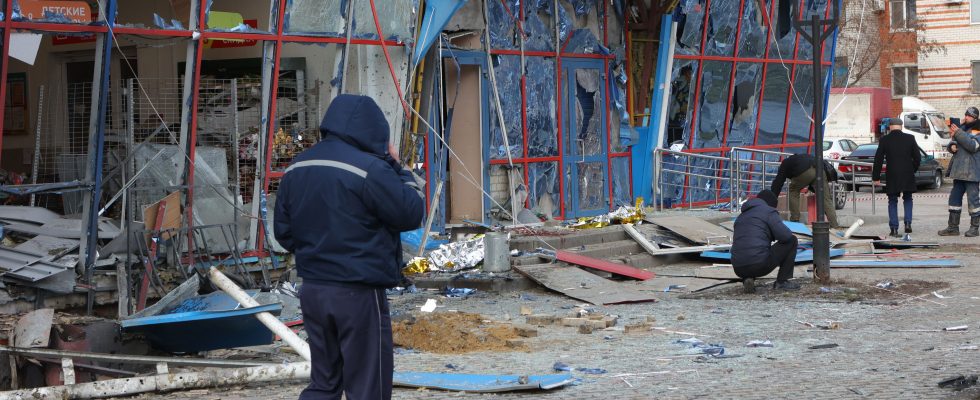Speaking before the UN Security Council during a session on Ukraine, Russia’s deputy UN ambassador, Dmitry Polyanskiy, said his country had no intention “to get rid of the leader of the Kiev regime”, Volodymyr Zelensky. The purpose of the Russian army remains, according to the deputy ambassador, to “achieve the objectives of our special military operation” – the name given by the Kremlin to Moscow’s invasion of Ukraine.
Information to remember
⇒ Moscow claims to have destroyed 47 Ukrainian drones
⇒ Russia assures that it has no intention of assassinating Volodymyr Zelensky
⇒ Erdogan says he is ready to host a Russian-Ukrainian peace summit
Russia claims to have destroyed 47 Ukrainian drones
On the night of Friday March 8 to Saturday March 9, 47 Ukrainian drones were destroyed, the Russian army said on social networks. 41 were located above the Rostov region, three in Volgograd, two in Kursk and the last one on the territory of the Belgorod region.
Moscow says it has no intention of assassinating Volodymyr Zelensky
“This is not part of our plans.” The deputy ambassador to the UN for Russia, Dmitry Polyanskiy, affirmed that his country had no intention “of getting rid of the leader of the kyiv regime”, Volodymyr Zelensky. Dmitry Polyanskiy was speaking before the UN Security Council during a session on Ukraine, according to the Russian state news agency TASS.
“Do you really think that if we wanted to hit Zelensky’s motorcade, we wouldn’t be able to?” he asked, while recalling that the Russian army had recently targeted “a drone production center naval vessels assembled using components supplied by the British”. These comments seem to refer to the Russian strike carried out on Wednesday March 6 against a hangar in Odessa. Five people died, according to the Ukrainian navy.
“This target was much more important to us than Zelensky, who continues to wander along the front line, taking selfies in towns, before they are liberated by Russian troops,” insisted Dmitry Polyanskiy. The goal of the Russians, according to the deputy ambassador: “Achieve the objectives of our special military operation” – the name given by the Kremlin to Russia’s invasion of Ukraine.
Erdogan says he is ready to host a Russian-Ukrainian peace summit
At the end of a meeting with his Ukrainian counterpart Volodymyr Zelensky in Istanbul, this Friday March 8, Turkish President Recep Tayyip Erdogan said he was ready to host a Russia-Ukraine peace summit. The Turkish head of state also reiterated his “support for the sovereignty and territorial integrity of [son] strategic ally, Ukraine.
“While continuing our solidarity with Ukraine, we will continue to work to end the war and in favor of a just and negotiated peace,” he insisted. Volodymyr Zelensky expressed his “gratitude” to his Turkish counterpart, who “from the beginning […] recognized the territorial integrity and [la] sovereignty [de l’Ukraine]including concerning the Ukrainian peninsula of Crimea” annexed by Moscow in 2014.
And the Ukrainian president added: “Any proposal for the settlement of this war must start from the formula proposed by the country which defends its territory and its people,” he added. “We want a just peace.” As a reminder, Ukraine has set the withdrawal of Russian troops from its territory as a precondition for talks with Moscow.
Furthermore, Volodymyr Zelensky said he had “transmitted a list of Ukrainian citizens, in particular Crimean Tatars, who are repressed by Russia in the occupied territories and detained in Russian prisons and camps in extremely cruel and inhumane conditions.”
Russia, an “alcoholic or drug addict, whose actions we cannot predict”, according to Latvian Prime Minister
“We live next to a neighbor who, one might say, is like an alcoholic or drug addict, whose actions we cannot predict.” These are the words that Latvian Prime Minister Evika Silina, when asked about the security risks for her country posed by Russia, described Russia. And he continued, speaking to Latvian public radio: “We must be aware that we live next to Russia, to Belarus.”
A former republic of the Soviet Union, Latvia is a member of NATO and the European Union and shares a 214-kilometer border with Russia. A situation which raises concerns from Latvia, but also from the two other Baltic states, Estonia and Lithuania, which could be Moscow’s next targets in the event of victory in Ukraine.
In January, these three countries decided to strengthen the protection of their borders with Russia and Belarus, citing the need to deter and defend against military threats. Evika Silina said that Vladimir Putin was trying to “scare the surrounding countries.”
